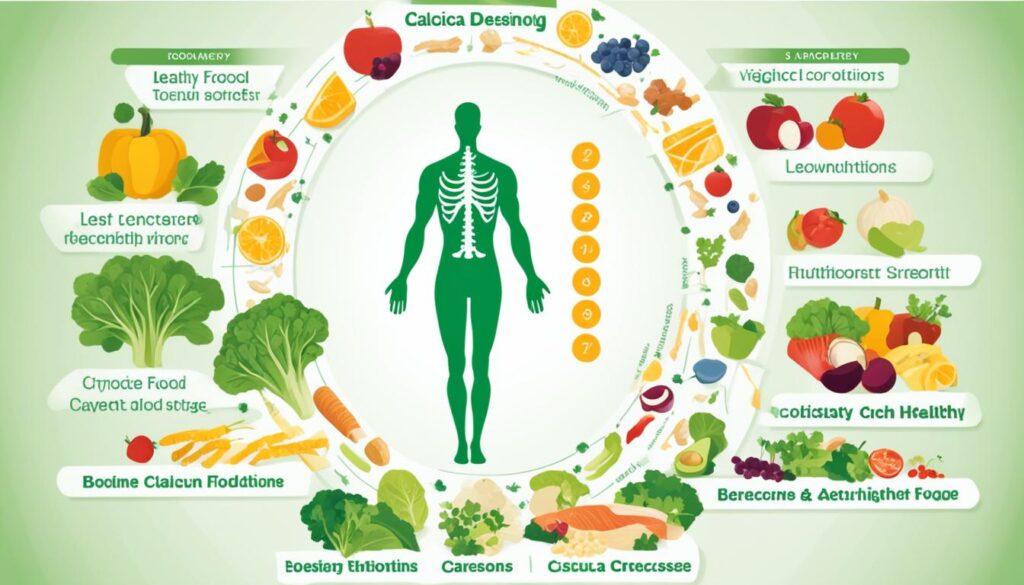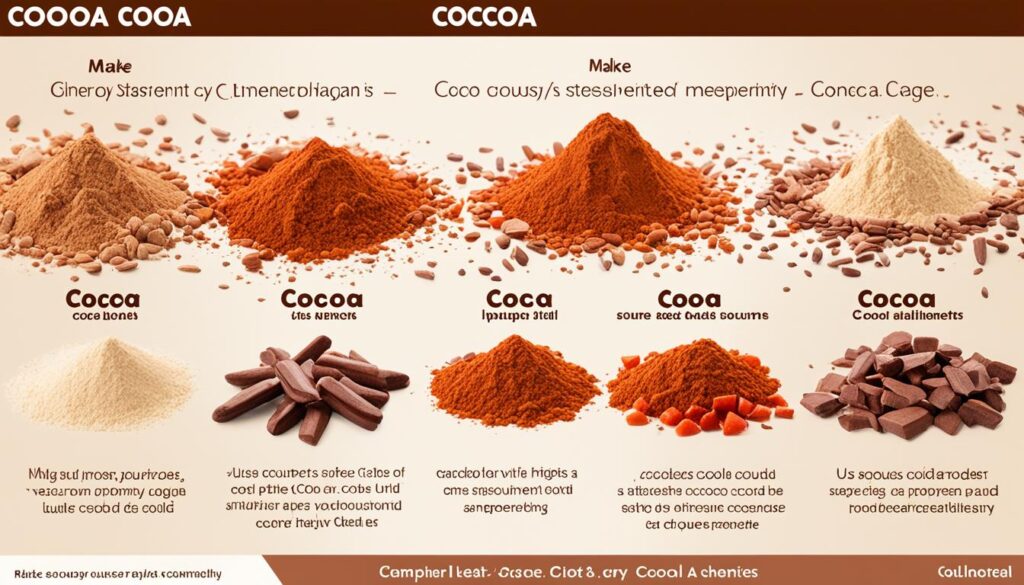Cocoa, a beloved ingredient in many indulgent treats, may hold the key to supporting strong and healthy bones. As a rich source of flavanols, a type of antioxidant compound, cocoa has been the subject of growing scientific interest for its potential benefits on bone health. This article will delve into the relationship between cocoa consumption and its effects on bone density, strength, and overall skeletal integrity. Prepare to uncover the intriguing connections between your favorite chocolate indulgence and the strength of your bones.
Key Takeaways
- Cocoa is a rich source of flavanols, which are antioxidants that may positively impact bone health.
- Consuming cocoa has been associated with increased bone density and improved skeletal strength.
- The potential mechanisms by which cocoa benefits bone health involve modulating cellular and molecular pathways.
- Moderate cocoa intake, typically 20-40 grams per day, may be optimal for maximizing bone health benefits.
- Cocoa consumption should be considered alongside other important factors, such as exercise and nutrient intake, for comprehensive bone health support.
Introduction to Cocoa and its Potential Benefits
Cocoa, derived from the seeds of the Theobroma cacao tree, has a rich history dating back thousands of years. Originally cultivated by Mesoamerican civilizations, cocoa was highly revered for its medicinal and ceremonial properties. Today, cocoa is a widely consumed ingredient in various food and beverage products, such as chocolate, hot cocoa, and cocoa powder.
The History and Origins of Cocoa
The origins of cocoa can be traced back to the ancient Mesoamerican civilizations, including the Olmecs, Mayans, and Aztecs. These cultures recognized the nutritional and therapeutic value of the cocoa bean, using it in religious rituals, as a form of currency, and as a medicinal remedy. The cocoa history is deeply intertwined with the cultural traditions of these indigenous peoples, who were the first to cultivate and revere the cocoa origins.
Nutritional Composition of Cocoa
Cocoa is a rich source of various nutrients and bioactive compounds, including cocoa flavanols, methylxanthines (such as theobromine), fiber, and essential minerals like magnesium, iron, and copper. This unique cocoa nutritional profile contributes to the numerous cocoa benefits that have been associated with its consumption, including potential positive effects on cardiovascular health, cognitive function, and mood.
Cocoa’s Relationship with Bone Health

Antioxidants play a crucial role in maintaining bone health by mitigating the harmful effects of oxidative stress, which can contribute to bone loss and weakening. The cocoa flavanols, a type of potent antioxidant compounds found in cocoa, have been extensively studied for their potential benefits on bone density and overall skeletal health.
The Role of Antioxidants in Bone Health
Oxidative stress, characterized by an imbalance between the production of free radicals and the body’s ability to neutralize them, has been linked to various health issues, including bone-related disorders. Cocoa antioxidants, such as flavanols, possess the ability to scavenge these harmful free radicals, reducing inflammation and promoting a more favorable environment for healthy bone remodeling.
Effects of Cocoa Flavanols on Bone Density
Numerous studies have investigated the relationship between cocoa flavanols and bone density. The findings suggest that the consumption of cocoa-rich products may positively impact bone mineral density, potentially reducing the risk of osteoporosis and fractures. The proposed mechanisms behind this relationship involve the ability of cocoa flavanols to modulate bone metabolism, stimulate osteoblast activity (the cells responsible for bone formation), and suppress osteoclast activity (the cells responsible for bone resorption).
By maintaining a balance between bone formation and resorption, cocoa flavanols may contribute to the preservation of bone health and overall skeletal integrity. These insights provide a promising avenue for further research and potential dietary interventions targeting bone health through the incorporation of cocoa and its bioactive compounds.
How Does Cocoa Consumption Impact Bone Health?

Potential Mechanisms of Action
The potential mechanisms by which cocoa consumption may positively impact bone health are multifaceted. Cocoa flavanols, the potent antioxidants found in cocoa, have been shown to modulate various cellular and molecular pathways involved in bone metabolism. These flavanols possess anti-inflammatory properties that can help mitigate the harmful effects of oxidative stress, a key contributor to bone loss and weakening.
Furthermore, cocoa flavanols have been observed to stimulate the activity of osteoblasts, the cells responsible for bone formation, while also inhibiting the function of osteoclasts, the cells that break down bone. This delicate balance between bone-building and bone-resorbing processes is crucial for maintaining healthy bone density and strength.
Additionally, cocoa flavanols have been found to enhance the absorption and utilization of important bone-supporting nutrients, such as calcium and vitamin D, further bolstering their positive impact on bone health.
Clinical Studies and Findings
Several clinical studies have explored the relationship between cocoa consumption and bone health. A study published in the Journal of Nutrition found that postmenopausal women who consumed a daily cocoa-containing beverage experienced a significant increase in bone mineral density compared to the control group.
Another study, conducted in older adults, demonstrated that regular consumption of a cocoa-enriched supplement led to improved markers of bone formation and reduced markers of bone resorption, suggesting an overall enhancement of bone metabolism.
Furthermore, a systematic review and meta-analysis published in the Nutrition Journal concluded that cocoa consumption was associated with a higher bone mineral density, particularly in the lumbar spine and femoral neck regions, which are crucial for maintaining overall skeletal health.
These clinical findings, along with the proposed mechanisms of action, provide strong evidence that incorporating cocoa into a balanced diet can positively contribute to the maintenance of strong and healthy bones.
Recommended Cocoa Intake for Bone Health

To maximize the bone health benefits of cocoa, it’s important to consider the recommended intake and the optimal forms of cocoa consumption. While there is no single universal recommendation, studies suggest that consuming moderate amounts of cocoa, typically 20-40 grams per day, may be beneficial for maintaining healthy bones.
Forms of Cocoa for Optimal Bone Benefits
When it comes to incorporating cocoa into your diet for improved bone health, the form of cocoa you choose can make a difference. Different forms of cocoa, such as dark chocolate, cocoa powder, and unsweetened cocoa nibs, can provide varying levels of the beneficial flavanols that support bone health. It’s important to opt for minimally processed, high-quality cocoa products to ensure you’re getting the maximum nutritional value.
Incorporating Cocoa into a Balanced Diet
To reap the bone-boosting benefits of cocoa, it’s essential to consume it as part of a well-rounded, nutrient-dense diet. Cocoa can be incorporated into a variety of recipes, from baked goods and smoothies to hot beverages and snacks. By pairing cocoa with other bone-friendly nutrients, such as calcium, vitamin D, and protein, you can create a synergistic effect that supports overall skeletal health.
| Cocoa Form | Recommended Daily Intake | Potential Bone Health Benefits |
|---|---|---|
| Dark Chocolate (70-85% cocoa) | 20-40 grams | High in flavanols that may support bone density and strength |
| Cocoa Powder (unsweetened) | 10-20 grams | Concentrated source of bone-supportive antioxidants and minerals |
| Cocoa Nibs | 10-20 grams | Minimally processed form of cocoa with a high flavanol content |
Cocoa Consumption and Bone Health in Different Age Groups

The potential benefits of cocoa consumption for bone health may vary across different age groups. Research suggests that the impact of cocoa may be particularly beneficial for certain populations:
| Age Group | Potential Bone Health Benefits of Cocoa Consumption |
|---|---|
| Children and Adolescents | Cocoa flavanols may help support optimal bone development and growth, contributing to peak bone mass attainment during this critical period of skeletal maturation. |
| Young and Middle-Aged Adults | Regular cocoa consumption may help maintain bone density and strength, potentially reducing the risk of osteoporosis and fractures later in life. |
| Older Adults | Cocoa’s anti-inflammatory and antioxidant properties may be especially beneficial for older individuals, helping to mitigate age-related bone loss and fragility. |
It’s important to note that the optimal amount of cocoa consumption for bone health may vary based on individual factors, such as overall dietary intake, physical activity levels, and the presence of any underlying health conditions. Consulting with healthcare professionals is recommended to determine the appropriate cocoa consumption for specific age groups and individual needs.
Other Factors Affecting Bone Health

While cocoa consumption can play a beneficial role in maintaining bone health, it is important to recognize that it is just one of the many factors that influence skeletal integrity. Other important considerations include exercise, physical activity, calcium intake, and vitamin D levels.
Exercise and Physical Activity
Regular physical activity and exercise are essential for building and maintaining strong, healthy bones. Weight-bearing exercises, such as walking, jogging, or strength training, can help stimulate bone formation and improve bone density. Additionally, activities that challenge balance and coordination, like tai chi or yoga, can help prevent falls and reduce the risk of fractures.
Calcium and Vitamin D Intake
Calcium and vitamin D are critical nutrients for bone health. Calcium is the primary structural component of bones, and adequate intake is necessary for the development and maintenance of strong, dense bones. Vitamin D, on the other hand, plays a crucial role in the absorption and utilization of calcium, as well as the regulation of bone metabolism. Incorporating calcium-rich foods, such as dairy products, leafy greens, and fortified foods, and ensuring sufficient vitamin D intake, either through sun exposure or supplementation, can further support optimal bone health.
By considering these additional factors, along with the potential benefits of cocoa consumption, individuals can adopt a comprehensive approach to maintaining strong, healthy bones throughout their lifetime.
Potential Risks and Considerations

While the evidence suggests that moderate cocoa consumption can be beneficial for bone health, it is important to be mindful of potential risks and considerations. As with any dietary component, moderation is key when it comes to incorporating cocoa into one’s routine.
Moderation and Balanced Consumption
Excessive cocoa consumption may lead to potential side effects, such as digestive issues, headaches, or even disruptions to sleep patterns. It is recommended to consume cocoa in moderation, typically no more than 20-40 grams per day, as part of a balanced and nutritious diet. Focusing on a variety of bone-supportive foods, including dairy, leafy greens, and other sources of calcium and vitamin D, can help ensure optimal skeletal health.
Interactions with Medications
It is crucial to be aware of potential medication interactions when consuming cocoa. Cocoa contains compounds that may interfere with the absorption or effectiveness of certain medications, such as blood thinners, antidepressants, and blood pressure medications. Individuals taking prescription drugs should consult with their healthcare provider before significantly increasing their cocoa intake to ensure safe and effective management of their conditions.
By practicing moderation and considering potential medication interactions, individuals can safely incorporate the bone-health benefits of cocoa into their overall lifestyle and dietary choices, while minimizing any potential risks.
Cocoa vs. Other Dietary Sources for Bone Health

While cocoa can be a valuable contributor to bone health, it is essential to consider it alongside other dietary sources and supplementation options. The relationship between cocoa consumption and bone health is multifaceted, and a balanced approach that incorporates a variety of calcium-rich foods and complementary nutrients is recommended for optimal skeletal integrity.
Comparing Cocoa to Calcium-Rich Foods
Calcium is a crucial mineral for maintaining strong bones, and the 2020-2025 Dietary Guidelines for Americans advise obtaining calcium from sources like dairy products, seafood, lean meats, tofu made with calcium salts, and fish with edible bones. These foods are generally considered more reliable sources of calcium compared to cocoa, which can contain compounds like oxalate that may hinder mineral absorption. Studies have shown that the compound oxalate in chocolate can range from 500 to 900 milligrams per 100 grams, potentially interfering with the body’s ability to absorb calcium.
Complementary Foods and Supplements
While cocoa may offer some bone-protective benefits, particularly from its flavanol content, it should be viewed as a complementary component within a well-rounded, calcium-rich diet. The guidelines do not specifically caution against chocolate for bone health, but they advise limiting intake of foods high in added sugar and saturated fat. To ensure optimal bone health, it is recommended to consume cocoa in moderation and paired with a variety of calcium-rich foods, as well as consider taking calcium and vitamin D supplements as needed.
| Dietary Source | Calcium Content | Bone Health Impact |
|---|---|---|
| Dairy Products (milk, yogurt, cheese) | 300-400 mg per serving | Excellent source of calcium, promotes bone mineralization and strength |
| Seafood (sardines, salmon with bones) | 200-300 mg per serving | Provides calcium and other nutrients like vitamin D that support bone health |
| Tofu (made with calcium salts) | 200-300 mg per serving | Calcium-rich plant-based option for those avoiding dairy |
| Cocoa/Dark Chocolate | 40-100 mg per serving | Contains flavanols that may offer some bone-protective benefits, but lower in calcium compared to other sources |
By incorporating a diverse array of calcium-rich foods, complementing them with cocoa and other nutrient-dense options, and considering appropriate supplementation, individuals can optimize their bone health and leverage the potential benefits of cocoa consumption within a balanced dietary approach.
Lifestyle and Dietary Recommendations for Optimal Bone Health
To optimize bone health and leverage the potential benefits of cocoa consumption, a holistic approach that encompasses lifestyle and dietary factors is recommended. By incorporating cocoa into a well-balanced, bone-friendly diet and adopting an active lifestyle, individuals can take proactive steps towards maintaining strong and healthy bones.
Incorporating Cocoa into a Bone-Friendly Diet
Integrating moderate amounts of cocoa into your daily diet can be a valuable addition to your bone health regimen. Aim for 20-40 grams of cocoa or dark chocolate per day, as studies have shown this range to be associated with improved bone density and strength. Flavonoids found in cocoa can play a crucial role in supporting bone metabolism and mitigating the effects of oxidative stress on the skeletal system.
Exercise and Activity Guidelines
Regular physical activity is essential for maintaining strong bones and preventing age-related bone loss. Engage in a combination of weight-bearing exercises, such as walking, jogging, or resistance training, to stimulate bone formation and enhance overall bone health. Aim for at least 150 minutes of moderate-intensity exercise or 75 minutes of vigorous-intensity exercise per week, and incorporate activities that challenge your muscles and skeleton.
By adopting a well-rounded lifestyle that includes a bone-friendly diet with cocoa, along with regular exercise and physical activity, you can optimize your chances of maintaining optimal bone health throughout your lifespan.

Leave a Reply